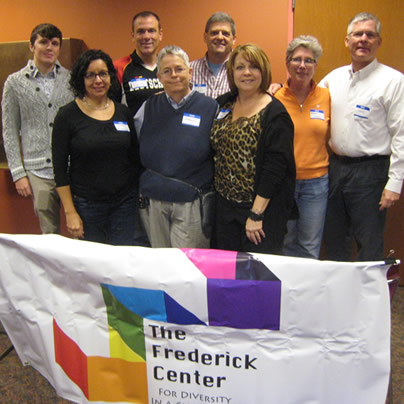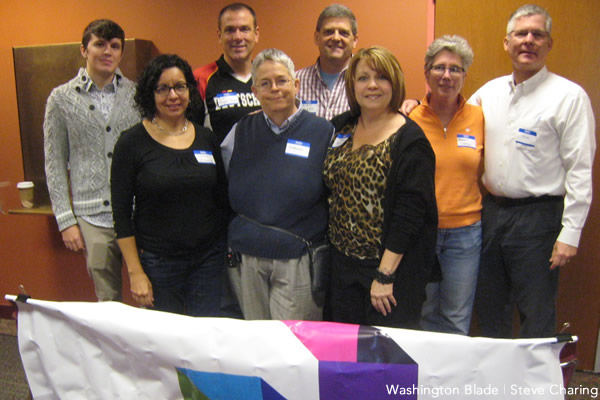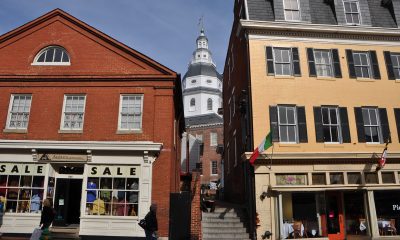Local
At the center of LGBTQ Frederick
Group celebrates 2nd anniversary helping youth, others


The Frederick Center’s leaders, from left: executive director Austin Beach; board members Diane Iñiguez, Rev. Dr. Robert Apgar-Taylor, Katherine Jones, Brian Walker, Cindie Beach, Maureen Conners and Peter Brehm. (Blade photo by Steve Charing)
There was a flurry of activity at the public library on E. Patrick Street in the heart of the historic district in Frederick, Md. on a recent Saturday morning. Inside, several people were lugging pamphlets, name tags, business cards, beverages and pastries into the library’s community room while others were setting up tables and chairs and preparing a Power Point presentation.
Outside the building on this cool October morning, you could peer through the famous spires of Frederick and see the autumn colors on Maryland’s mountains in the west. The foliage may as well have been rainbow colors, as the folks performing these tasks inside were getting ready for the second annual general meeting of the LGBTQ Frederick Center or simply The Frederick Center (TFC).
Fifteen years ago, the idea of a gay center in Frederick would have been considered unimaginable. Alex X. Mooney, a virulently anti-gay conservative Republican from Frederick was elected to the state Senate in 1998 using, in part, a message warning voters of the “homosexual agenda.” He once said, “Homosexual activists have managed to gain legal recognition as a minority, based solely on their lifestyle choices, through so-called ‘hate crimes’ and domestic partnership laws.”
Employing divisive rhetoric like that, Mooney was elected two more times, reaffirming Frederick’s conservative leanings, but with decreasing margins each time. But Mooney was finally unseated in 2010 by pro-LGBT former Frederick Mayor Ron Young.
Frederick County, an exurb of Washington D.C. and Baltimore—roughly equidistant to both—has seen a growth in population of around 25 percent since 2000. Much of this increase is attributed to an influx of young married white-collar workers and professionals or singles moving into new housing developments. Indeed, the median age in the county is seven years younger than the rest of the state.
With the arrival of younger, more educated residents, a less conservative tilt exists, but the political landscape has not shifted to the point where it is like Montgomery County or Baltimore City. Brian Walker, president of the TFC board, said while there has been progress inside Frederick especially due to the increasing number of affirming churches, “the attitude toward LGBT folks outside of Frederick has been spotty.”
But a pro-LGBTQ mindset appears to be on the rise here. Although in 2012, Mitt Romney defeated President Obama by a 50-47 percent margin in Frederick County, voters affirmed Question 6 on same-sex marriage by 2,400 votes or 51-49 percent.
The Frederick Center emerged because its founder realized something was missing.
“I felt there was a need for an LGBTQ center in Frederick because of my experience,” says Austin Beach, 21, who is also the executive director of TFC. “As a young man discovering my identity I had no resources that where easily available to me and I felt firsthand how that affected me. I didn’t want anyone else to go through that same process of feeling there was no one there to help them.” In January 2012, TFC was born.
Cindie Beach heads up TFC’s youth group, where “over the past two years, there had been a total of 70 youth and of those, seven were at one time homeless.” She said she also performed four suicide interventions. “To succeed, the youth must have a roof over their heads and food in their mouths,” she said. “We need emergency housing and long-term housing for these kids and a support system in place. Some get thrown out for being LGBT and appear at my door. It breaks my heart.”
TFC does not have a permanent home as of yet. It holds events in Frederick’s affirming churches and other pro-LGBTQ business establishments. But that could change.
“I envision the center being a focal point of support, resources, and education for Marylanders LGBTQ community both inside, but especially outside of the D.C. and Baltimore areas,” says Austin. “I hope to soon see us having our own space, offering transitional services, counseling, shelter space, etc. to the LGBTQ community and if all goes well, being on the forefront of LGBTQ advocacy in Maryland in the ever-growing area of Frederick”
For more information about The Frederick Center, visit thefrederickcenter.org.
Maryland
Rockville teen charged with plotting school shooting after FBI finds ‘manifesto’
Alex Ye charged with threats of mass violence

BY BRETT BARROUQUERE | A Montgomery County high school student is charged with what police describe as plans to commit a school shooting.
Andrea Ye, 18, of Rockville, whose preferred name is Alex Ye, is charged with threats of mass violence. Montgomery County Police and the FBI arrested Ye Wednesday.
The rest of this article can be found on the Baltimore Banner’s website.
District of Columbia
New D.C. LGBTQ+ bar Crush set to open April 19
An ‘all-inclusive entertainment haven,’ with dance floor, roof deck

D.C.’s newest LGBTQ+ bar called Crush is scheduled to open for business at 4 p.m. on Friday, April 19, in a spacious, two-story building with a dance floor and roof deck at 2007 14th St., N.W. in one of the city’s bustling nightlife areas.
A statement released by co-owners Stephen Rutgers and Mark Rutstein earlier this year says the new bar will provide an atmosphere that blends “nostalgia with contemporary nightlife” in a building that was home to a popular music store and radio supply shop.
Rutgers said the opening comes one day after Crush received final approval of its liquor license that was transferred from the Owl Room, a bar that operated in the same building before closing Dec. 31 of last year. The official opening also comes three days after Crush hosted a pre-opening reception for family, friends, and community members on Tuesday, April 16.
Among those attending, Rutgers said, were officials with several prominent local LGBTQ organizations, including officials with the DC Center for the LGBTQ Community, which is located across the street from Crush in the city’s Reeves Center municipal building. Also attending were Japer Bowles, director of the Mayor’s Office of LGBTQ Affairs, and Salah Czapary, director of the Mayor’s Office of Nightlife and Culture.
Rutgers said Crush plans to hold a grand opening event in a few weeks after he, Rutstein and the bar’s employees become settled into their newly opened operations.
“Step into a venue where inclusivity isn’t just a promise but a vibrant reality,” a statement posted on the Crush website says. “Imagine an all-inclusive entertainment haven where diversity isn’t just celebrated, it’s embraced as the very heartbeat of our venue,” the statement says. “Welcome to a place where love knows no bounds, and the only color or preference that matters is the vibrant tapestry of humanity itself. Welcome to Crush.”
The website says Crush will be open Tuesdays and Wednesdays from 4 p.m. to 12 a.m., Thursdays from 4 p.m. to 2 a.m., Fridays from 4 p.m. to 3 a.m., Saturdays from 2 p.m. to 3 a.m., and Sundays from 2 p.m. to 12 a.m. It will be closed on Mondays.
Crush is located less than two blocks from the U Street Metro station.
District of Columbia
Reenactment of first gay rights picket at White House draws interest of tourists
LGBTQ activists carry signs from historic 1965 protest

About 30 LGBTQ activists formed a circular picket line in front of the White House Wednesday afternoon, April 17, carrying signs calling for an end to discrimination against “homosexuals” in a reenactment of the first gay rights protest at the White House that took place 59 years earlier on April 17, 1965.
Crowds of tourists looked on with interest as the activists walked back and forth in silence in front of the White House fence on Pennsylvania Avenue. Like the 1965 event, several of the men were dressed in suits and ties and the women in dresses in keeping with a 1960s era dress code policy for protests of the Mattachine Society of Washington, D.C., the city’s first gay rights group that organized the 1965 event.
Wednesday’s reenactment was organized by D.C.’s Rainbow History Project, which made it clear that the event was not intended as a protest against President Joe Biden and his administration, which the group praised as a strong supporter of LGBTQ rights.
“I think this was an amazing event,” said Vincent Slatt, the Rainbow History Project official who led efforts to put on the event. “We had twice as many that we had hoped for that came today,” he said.
“It was so great to see a reenactment and so great to see how far we’ve come,” Slatt said. “And also, the acknowledgement of what else we still need to do.”
Slatt said participants in the event who were not carrying picket signs handed out literature explaining the purpose of the event.
A flier handed out by participants noted that among the demands of the protesters at the 1965 event were to end the ban on homosexuals from working in the federal government, an end to the ban on gays serving in the military, an end to the denial of security clearances for gays, and an end of the government’s refusal to meet with the LGBTQ community.
“The other thing that I think is really, really moving is some of the gay staff inside the White House found out this was happening and came out to greet us,” Slatt said. He noted that this highlighted how much has changed since 1965, when then President Lyndon Johnson’s White House refused to respond to a letter sent to Johnson from the Mattachine Society explaining its grievances.
“So now to have gay people in the White House coming out to give us their respects and to say hello was especially meaningful to us,” Slatt said. “That was not expected today.”
Among those walking the picket line was longtime D.C. LGBTQ rights advocate Paul Kuntzler, who is the only known surviving person who was among the White House picketers at the April 1965 event. Kuntzler said he proudly carried a newly printed version of the sign at Wednesday’s reenactment event that he carried during the 1965 protest. It stated, “Fifteen Million Homosexuals Protest Federal Treatment.”
Also participating in the event was Japer Bowles, director of D.C. Mayor Muriel Bowser’s Office of LGBTQ Affairs. Bowles presented Slatt with a proclamation issued by Bowser declaring April 17, 2024, Mattachine Society Day in Washington, D.C.
“Whereas, on April 17, 1965, the Mattachine Society of Washington courageously held the nation’s inaugural picket for gay rights, a seminal moment in the ongoing struggle for LGBTQIA+ equality in the United States, marking the genesis of public demonstrations advocating for those rights and paving the way for Pride Marches and Pride celebrations worldwide,” the proclamation states.
About 30 minutes after the reenactment event began, uniformed Secret Service agents informed Slatt that due to a security issue the picketers would have to move off the sidewalk in front of the White House and resume the picketing across the street on the sidewalk in front of Lafayette Park. When asked by the Washington Blade what the security issue was about, one of the Secret Service officers said he did not have any further details other than that his superiors informed him that the White House sidewalk would have to be temporarily cleared of all people.
Participants in the event quickly resumed their picket line on the sidewalk in front of Lafayette Park for another 30 minutes or so in keeping with the 1965 picketing event, which lasted for one hour, from 4:20 p.m. to 5:20 p.m., according to Rainbow History Project’s research into the 1965 event.
Although the LGBTQ picketers continued their procession in silence, a separate protest in Lafayette Park a short distance from the LGBTQ picketers included speakers shouting through amplified speakers. The protest was against the government of Saudi Arabia and organized by a Muslim group called Al Baqee Organization.
A statement released by the Rainbow History Project says the reenactment event, among other things, was a tribute to D.C.-area lesbian rights advocate Lilli Vincenz, who participated in the 1965 White House picketing, and D.C. gay rights pioneer Frank Kameny, who founded the Mattachine Society of Washington in the early 1960s and was the lead organizer of the 1965 White House protest. Kameny died in 2011 and Vincenz died in 2023.
The picket signs carried by participants in the reenactment event, which were reproduced from the 1965 event, had these messages:
• “DISCRIMINATION Against Homosexuals is as immoral as Discrimination Against Negroes and Jews;”
• “Government Should Combat Prejudice NOT PROMOTE IT”
• “White House Refuses Replies to Our Letters, AFRAID OF US?
• “HOMOSEXUALS Died for their Country, Too”
• “First Class Citizenship for HOMOSEXUALS”
• “Sexual Preference is Irrelevant to Employment”
• “Fifteen Million U.S. Homosexuals Protest Federal Treatment”
-

 Africa4 days ago
Africa4 days agoCongolese lawmaker introduces anti-homosexuality bill
-

 District of Columbia1 day ago
District of Columbia1 day agoReenactment of first gay rights picket at White House draws interest of tourists
-

 World4 days ago
World4 days agoOut in the World: LGBTQ news from Europe and Asia
-

 Arizona1 day ago
Arizona1 day agoAriz. governor vetoes anti-transgender, Ten Commandments bill












